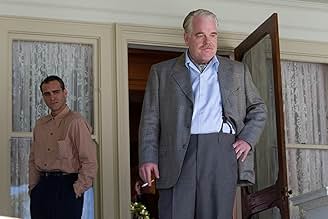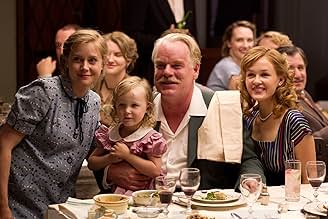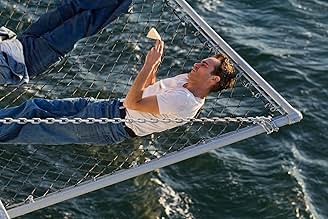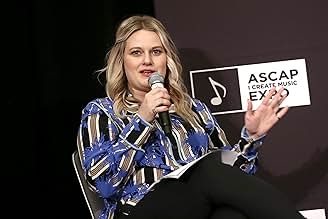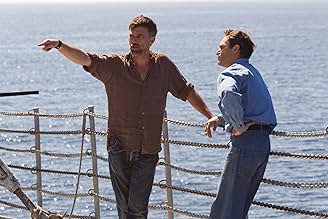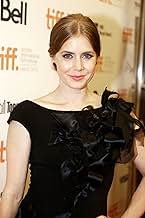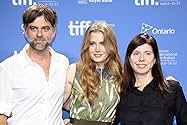The Master
- 2012
- Tous publics
- 2h 18m
A Naval veteran arrives home from war unsettled and uncertain of his future - until he is tantalized by a cult and its charismatic leader.A Naval veteran arrives home from war unsettled and uncertain of his future - until he is tantalized by a cult and its charismatic leader.A Naval veteran arrives home from war unsettled and uncertain of his future - until he is tantalized by a cult and its charismatic leader.
- Director
- Writer
- Stars
- Nominated for 3 Oscars
- 75 wins & 187 nominations total
Patrick Wilder
- V.A. Patient
- (as Patrick Biggs)
- Director
- Writer
- All cast & crew
- Production, box office & more at IMDbPro
Featured reviews
I will never understand how Phoenix and Hoffman didn't win the Oscars. Specially Joaquin, I truly think it is the best actor performance I ever watched in my life. The movie is great, although is not for everyone, you must watch it with the right mindset and pay attention to every detail. Most new actors should watch this movie to take notes on how to be a better actor. Cheers.
I had no clue what I was heading into when I pressed play. I think it's really hard to make a bad movie when you have Philip Seymour Hoffman, Jaoquin Phoenix, Amy Adams, and Jesse Plemons leading the charge. Hoffman and Phoenix are fully absorbed into their characters and the film forces its audience to try and follow these conversations that somehow feel super grounded (due to Hoffman's amazing delivery) and unsettling at the same time. This movie really could not have worked without the talent of these actors.
Amy Adams does so much with so little screen time; I do wish we got more time with her but I think her lack of presence contributes to the messaging of the film. She gives an extremely pulled back/subtle performance of a woman that is truly in the middle of the storm.
This feels fresh and distinct from any other movie I've watched, so I'd definitely recommend it.
Amy Adams does so much with so little screen time; I do wish we got more time with her but I think her lack of presence contributes to the messaging of the film. She gives an extremely pulled back/subtle performance of a woman that is truly in the middle of the storm.
This feels fresh and distinct from any other movie I've watched, so I'd definitely recommend it.
The Master (2012)
**** (out of 4)
Paul Thomas Anderson's latest centers on Freddie Quell (Joaquin Phoenix), a trouble man who after serving in WWII finds himself wondering around, getting addicted to alcohol and not really having a place in life. This is when he comes across a man some call The Master (Philip Seymour Hoffman) who begins to make him see life in a different way. THE MASTER is pretty much about L. Ron Hubbard and Scientology but I'm sure for legal reasons this isn't ever really spelled out. I will admit that I hated MAGNOLIA but found both BOOGIE NIGHTS and THERE WILL BE BLOOD to be extremely good movies even if I didn't love them like most people did. This film here is without question the greatest of the director's career and it's rather amazing to watch because of how slow it moves. I'm not saying it's slow in a bad way, instead the director really takes his time letting the viewer get to know the characters and before long you're really wrapped up in what's going on and can't turn away. I'm sure many people are going to want to read into what's going on. I'm sure many people will be coming to the film just to bash Scientology. For me this film really doesn't take a stand one way or another but instead it gives us a couple of the most memorable characters in recent years and their journey is something quite chilling and downright impossible to ignore. Of course, one of the greatest benefits is that you've got two of the best actors working together and performing magic. Phoenix has always been an underrated actor and this here might be the best performance of his career. There are so many sides and emotions to this character yet Phoenix reaches all of them without a problem and is downright haunting during certain scenes. Even his rages of anger are downright chilling. Hoffman, who seems to be doing one masterpiece job after another, also delivers here. I really enjoyed how un-flashy he made the character and I really liked that he didn't just scream like a maniac. There's certainly some very funny screaming matches but the way Hoffman builds up to these moments is just magical to watch. Amy Adams does a very good job in her supporting role but I think there's no doubt that the film belongs to the two leads. Jonny Greenwood's music score really grabs you from the first time you hear it and it perfectly fits with what's going on in the film. The cinematography by Mihai Malaimare, Jr. is downright masterful and the use of 70mm is something I thought wouldn't work in a film like this but the visual look it gives the film shows that it was the right choice. THE MASTER probably won't appeal to everyone but even if you don't like the subject, the two performances are just so great that this is still a must see picture.
**** (out of 4)
Paul Thomas Anderson's latest centers on Freddie Quell (Joaquin Phoenix), a trouble man who after serving in WWII finds himself wondering around, getting addicted to alcohol and not really having a place in life. This is when he comes across a man some call The Master (Philip Seymour Hoffman) who begins to make him see life in a different way. THE MASTER is pretty much about L. Ron Hubbard and Scientology but I'm sure for legal reasons this isn't ever really spelled out. I will admit that I hated MAGNOLIA but found both BOOGIE NIGHTS and THERE WILL BE BLOOD to be extremely good movies even if I didn't love them like most people did. This film here is without question the greatest of the director's career and it's rather amazing to watch because of how slow it moves. I'm not saying it's slow in a bad way, instead the director really takes his time letting the viewer get to know the characters and before long you're really wrapped up in what's going on and can't turn away. I'm sure many people are going to want to read into what's going on. I'm sure many people will be coming to the film just to bash Scientology. For me this film really doesn't take a stand one way or another but instead it gives us a couple of the most memorable characters in recent years and their journey is something quite chilling and downright impossible to ignore. Of course, one of the greatest benefits is that you've got two of the best actors working together and performing magic. Phoenix has always been an underrated actor and this here might be the best performance of his career. There are so many sides and emotions to this character yet Phoenix reaches all of them without a problem and is downright haunting during certain scenes. Even his rages of anger are downright chilling. Hoffman, who seems to be doing one masterpiece job after another, also delivers here. I really enjoyed how un-flashy he made the character and I really liked that he didn't just scream like a maniac. There's certainly some very funny screaming matches but the way Hoffman builds up to these moments is just magical to watch. Amy Adams does a very good job in her supporting role but I think there's no doubt that the film belongs to the two leads. Jonny Greenwood's music score really grabs you from the first time you hear it and it perfectly fits with what's going on in the film. The cinematography by Mihai Malaimare, Jr. is downright masterful and the use of 70mm is something I thought wouldn't work in a film like this but the visual look it gives the film shows that it was the right choice. THE MASTER probably won't appeal to everyone but even if you don't like the subject, the two performances are just so great that this is still a must see picture.
Yes, herein contains some of the most ravishing filmmaking of the new millennium. The period details are abstract yet precise. The score has a stark, primordial allure. It's post-WWII America: Psychologically scarred veterans attempt to cramp themselves back into society. One is loner Freddie Quell, adrift in emotional confusion. He's secured a gig as a portrait photographer at a lavish department store imagined like a temple of indulgent commercialism. But Freddie doesn't last long there. In the darkroom, he screws models and chugs rotgut he makes with photo chemicals. Ultimately, he loses it on a customer, not just hitting him but harassing and lambasting him, working out some indecipherable, irrepressible rage.
Phoenix's performance as Freddie reduces all he's done before to a preparation exercise. He longs for something, but even he can't tell you what, and that sorrow has clotted into self- destructive ritual. We see his snarly face from angles we haven't seen before. We're not sure if his leery eyes are hateful or if he's dead inside. He's a captivating animal.
Then he meets stout, articulate Lancaster Dodd, always circled by people who treat him like a prodigy, hanging on his every word, laughing at all his mugging. Lancaster fancies himself a renaissance man. He's married to Peggy, who's much more vigilant than we first think. His son trails the proceedings with a dormant pose of derision. His daughter marries a man who, like everyone else in their clique, views him as a wizard.
The film belongs to Phoenix, but Hoffman more than does his thing, his affectations ringing with conceit and fraudulence. Freddie---father dead, mother institutionalized---is naturally drawn to Dodd, who promises answers, mental freedom, happiness, even claims to cure leukemia. He's written a book his bootlickers treat as a sort of bible. He loves to charm and perform.
It's well-known that Lancaster's cult is inspired by L. Ron Hubbard's Scientology. It's not direct, but the manner in which Lancaster draws Freddie into the fold, among other things, is unmistakably influenced by the contentious institution and Hubbard's life. Paul Thomas Anderson doesn't bind to that inspiration for his movie...but he doesn't bind to anything, really. You walk out muddled, wearied, wondering where to start in connecting the dots in this elegant, arresting movie. The story is as confounding as its technique is magnificent.
Anderson, the true wunderkind of the Tarantino generation, sets everything up so beautifully, you wait for the turning point to prevail so the intrigue can come to boil. Instead, nothing progresses. The dramatic developments seem to dwindle and become less consistent as the movie drifts along, and Anderson throws in pauses, like a lingering desert scene or an outstretched montage in which Freddie is made to pace in a room, that slow the movie to a drudge. Freddie's sex preoccupation, which was stressed in the film's early stretch, grows dissonant. It's less about narrative arc and more the emotional condition of two men, a twist of trust and mistrust, id and superego. PTA's vision is grand in scope, but his result is not so much ambiguous as opaque and detached.
For the first time in his immaculate career, the greatest filmmaker of his generation seems to languish. His newfound frigidness makes the film easy to admire but difficult to love. Anderson is so stunningly impressive, in fact, that it's taken me two viewings of The Master to admit all this to myself. Understandably, some critics have patronized it as deliberately evasive and occult, but isn't that just double-talk? A glorification of an artist's failure to proportionately bear his ideas? Something particularly intriguing is how the movie poses questions not so much about the importance of faith, but how far the human limit for change can extend and to confront emotional devastation so heavy it can never recover. But the film is too ambivalent or cautious to probe them in depth. By the end, it's become an opaque challenge between two phenomenal actors whose commitment to their roles is awe-inspiring, but it's manacled to a work so in awe of itself, the audience gets blockaded.
Phoenix's performance as Freddie reduces all he's done before to a preparation exercise. He longs for something, but even he can't tell you what, and that sorrow has clotted into self- destructive ritual. We see his snarly face from angles we haven't seen before. We're not sure if his leery eyes are hateful or if he's dead inside. He's a captivating animal.
Then he meets stout, articulate Lancaster Dodd, always circled by people who treat him like a prodigy, hanging on his every word, laughing at all his mugging. Lancaster fancies himself a renaissance man. He's married to Peggy, who's much more vigilant than we first think. His son trails the proceedings with a dormant pose of derision. His daughter marries a man who, like everyone else in their clique, views him as a wizard.
The film belongs to Phoenix, but Hoffman more than does his thing, his affectations ringing with conceit and fraudulence. Freddie---father dead, mother institutionalized---is naturally drawn to Dodd, who promises answers, mental freedom, happiness, even claims to cure leukemia. He's written a book his bootlickers treat as a sort of bible. He loves to charm and perform.
It's well-known that Lancaster's cult is inspired by L. Ron Hubbard's Scientology. It's not direct, but the manner in which Lancaster draws Freddie into the fold, among other things, is unmistakably influenced by the contentious institution and Hubbard's life. Paul Thomas Anderson doesn't bind to that inspiration for his movie...but he doesn't bind to anything, really. You walk out muddled, wearied, wondering where to start in connecting the dots in this elegant, arresting movie. The story is as confounding as its technique is magnificent.
Anderson, the true wunderkind of the Tarantino generation, sets everything up so beautifully, you wait for the turning point to prevail so the intrigue can come to boil. Instead, nothing progresses. The dramatic developments seem to dwindle and become less consistent as the movie drifts along, and Anderson throws in pauses, like a lingering desert scene or an outstretched montage in which Freddie is made to pace in a room, that slow the movie to a drudge. Freddie's sex preoccupation, which was stressed in the film's early stretch, grows dissonant. It's less about narrative arc and more the emotional condition of two men, a twist of trust and mistrust, id and superego. PTA's vision is grand in scope, but his result is not so much ambiguous as opaque and detached.
For the first time in his immaculate career, the greatest filmmaker of his generation seems to languish. His newfound frigidness makes the film easy to admire but difficult to love. Anderson is so stunningly impressive, in fact, that it's taken me two viewings of The Master to admit all this to myself. Understandably, some critics have patronized it as deliberately evasive and occult, but isn't that just double-talk? A glorification of an artist's failure to proportionately bear his ideas? Something particularly intriguing is how the movie poses questions not so much about the importance of faith, but how far the human limit for change can extend and to confront emotional devastation so heavy it can never recover. But the film is too ambivalent or cautious to probe them in depth. By the end, it's become an opaque challenge between two phenomenal actors whose commitment to their roles is awe-inspiring, but it's manacled to a work so in awe of itself, the audience gets blockaded.
What is the nature of man? Is he so depraved and aberrated that he must grovel in his own misery all the days of his life? Or is he merely asleep, bound by the negative emotions of his previous existences, hoping that his perfect nature will be resurrected one fine day? Director Paul Thomas Anderson has long been heralded as a philosopher of the human condition. In his 2012 film, The Master, Anderson employs powerful performances by Joaquin Phoenix and Philip Seymour Hoffman to readdress themes he discussed in There Will Be Blood (2007).
Freddie Quell (Phoenix) is a Navy WWII veteran with an insatiable lust for sex and alcohol. After accidently producing a batch of liquor that kills a man in Salinas, he flees and hides away aboard a boat captained by Lancaster Dodd (Hoffman). Dodd is the leader of a budding cult which appears all too similar to L. Ron Hubbard's Scientology. Over several months and multiple "processing" sessions Dodd hopes to cure Quell of his "animal" tendencies. The film spirals as it begs to resolve who will be the master and who will be the slave.
Anderson offers a honest vignette of humanity, painting fleshly desire and moral rationalism plainfully for all to see. The Master's audience walks away in fear, identifying their lowest self with Dodd's actions. The film's emotional response is greatly in part due to Phoenix and Hoffman's explosive chemistry. The duo delivers possibly the greatest scene of dialogue in the last 50 years. Anderson, who also wrote the screenplay, perfectly crafts the film's hypnotic and symbolic interchanges. Every frame is visually striking thanks to Mihai Malaimare Jr.'s cinematography. Often, more than not, more can be gleaned from scenes' blocking than actual words or action. Characters appear larger when they are in control and symmetrical shots are largely abandoned to display who is the scene' subject.
The Master is a film for thinking. No viewer is allowed to be numb during its showcasing. This principle likely played to a drop in its commercial success, but it reminds us that there is still room in the world for gorgeous shots, heavy subtext, and low concept plots. The Master, along with There Will Be Blood and Inherent Vice, has printed Anderson's name in the annals of brilliant filmmakers.
Freddie Quell (Phoenix) is a Navy WWII veteran with an insatiable lust for sex and alcohol. After accidently producing a batch of liquor that kills a man in Salinas, he flees and hides away aboard a boat captained by Lancaster Dodd (Hoffman). Dodd is the leader of a budding cult which appears all too similar to L. Ron Hubbard's Scientology. Over several months and multiple "processing" sessions Dodd hopes to cure Quell of his "animal" tendencies. The film spirals as it begs to resolve who will be the master and who will be the slave.
Anderson offers a honest vignette of humanity, painting fleshly desire and moral rationalism plainfully for all to see. The Master's audience walks away in fear, identifying their lowest self with Dodd's actions. The film's emotional response is greatly in part due to Phoenix and Hoffman's explosive chemistry. The duo delivers possibly the greatest scene of dialogue in the last 50 years. Anderson, who also wrote the screenplay, perfectly crafts the film's hypnotic and symbolic interchanges. Every frame is visually striking thanks to Mihai Malaimare Jr.'s cinematography. Often, more than not, more can be gleaned from scenes' blocking than actual words or action. Characters appear larger when they are in control and symmetrical shots are largely abandoned to display who is the scene' subject.
The Master is a film for thinking. No viewer is allowed to be numb during its showcasing. This principle likely played to a drop in its commercial success, but it reminds us that there is still room in the world for gorgeous shots, heavy subtext, and low concept plots. The Master, along with There Will Be Blood and Inherent Vice, has printed Anderson's name in the annals of brilliant filmmakers.
Did you know
- TriviaDuring the jail cell scene, Joaquin Phoenix breaks a real toilet. His actions were entirely improvised. Due to the historical past of the building where the scene took place, the toilet was considered "historical." Joaquin had no intentions to break the toilet, nor did he think it was possible.
- GoofsIn the "pacing" scene, as Quell goes from wooden paneled wall to window and back, the second time he goes to he wooden paneling, he breaks out a panel when he pounds it with rage. In the numerous successive shots, the wood panel is restored.
- Quotes
Lancaster Dodd: If you figure a way to live without serving a master, any master, then let the rest of us know, will you? For you'd be the first person in the history of the world.
- Crazy creditsAfter its title, this film has no further opening credits.
- ConnectionsEdited into Conspiracy: The Hollywood Syndicate (2015)
- SoundtracksBaton Sparks
From '48 Reponses to Polymorphia'
Written by Jonny Greenwood
Performed by The Aukso Chamber Orchestra
Courtesy of Unreliable Ltd.
Details
- Release date
- Country of origin
- Languages
- Also known as
- The Master: Todo Hombre Necesita Un Guía
- Filming locations
- Mare Island, Vallejo, California, USA(as Philadelphia, Pennsylvania and various houses, a park and the docks)
- Production companies
- See more company credits at IMDbPro
Box office
- Budget
- $32,000,000 (estimated)
- Gross US & Canada
- $16,377,274
- Opening weekend US & Canada
- $736,311
- Sep 16, 2012
- Gross worldwide
- $28,689,359
- Runtime
- 2h 18m(138 min)
- Color
- Sound mix
- Aspect ratio
- 1.85 : 1
Contribute to this page
Suggest an edit or add missing content







